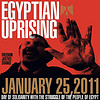Tech-savvy youth liberate Egypt

After thirty years of political and economic repression, the regime of President Hosni Mubarek of Egypt was ousted. On January 25, 2011, protests against the dictatorship began through an unprecedented use of non-violence and technology.
Before Mubarek shut down the Internet and cell phone service in the country, Egyptian youth rallied the country through Facebook and Twitter. The Keystroke Revolution* had begun. Although the potential for violence was huge, the demonstrators in Cairo and Alexandria remained, for the most part, peaceful. Even following a government crackdown that killed 300, the masses remained committed to non-violence.
After 18 days, on February 11, 2011, Mubarek announced his resignation and left the capitol. The military took over the government until free elections can be held sometime this next year.
One of the key organizers of the movement was Google marketing executive Wael Ghonim. Referred to as Egypt’s most famous cyber-dissident, Ghonim was arrested during the first week of the demonstrations and held blindfolded for twelve days. Once released he proclaimed “If you want to liberate a government, give them the Internet.”
Now the work begins to build a free and effective government. President Obama offered assistance to help Egypt “pursue a credible transition to a democracy” if U.S. assistance is requested.
Dr. Martin Luther King, Jr. must have smiled down on the Egyptian people for in 1964 he said:
“Nonviolence is the answer to the crucial political and moral questions of our time; the need for mankind to overcome oppression and violence without resorting to oppression and violence. Mankind must evolve for all human conflict a method which rejects revenge, aggression, and retaliation. The foundation of such a method is love.”
*Newsweek, February 7, 2011.





Viva revolution!